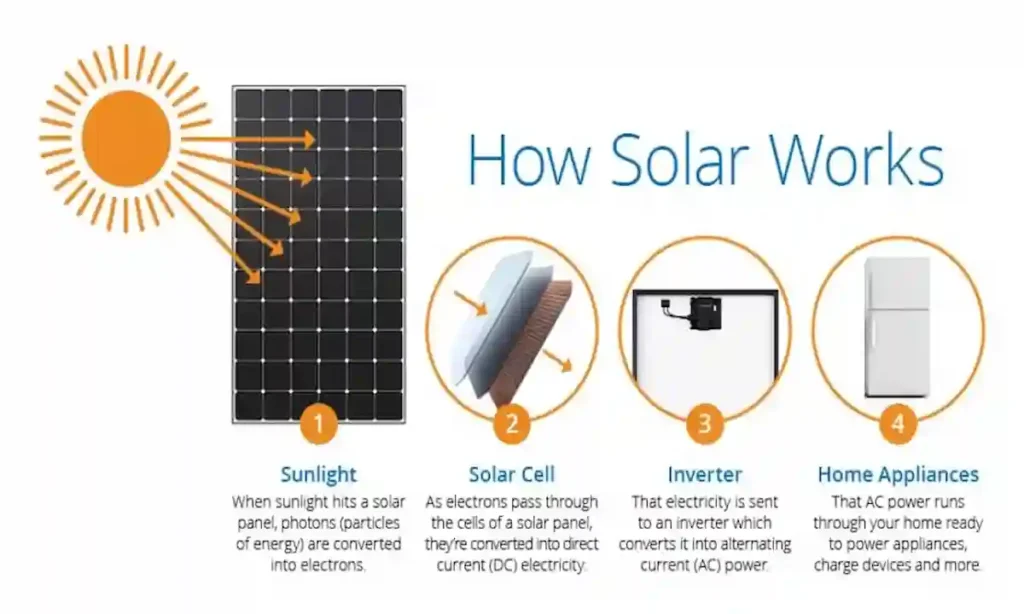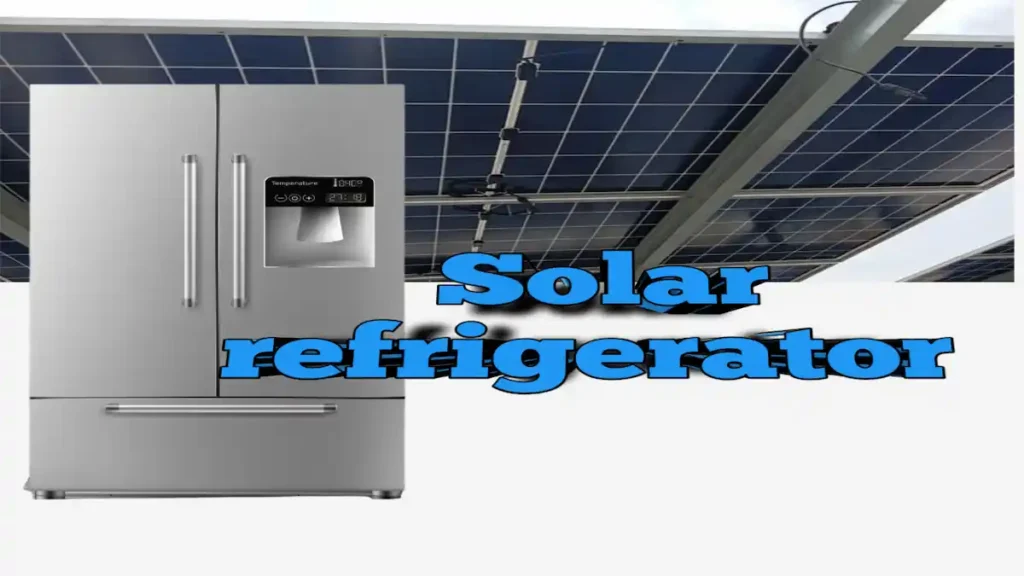Solar refrigerators use solar panels to run without any electricity. These solar panels charge storage devices that provide an energy source to the compressor of the refrigerator. Therefore, the stored energy can maintain the refrigerator’s functioning – keep it cold overnight, cloudy days.
A solar-energy fridge is futuristic, first envisioning keeping food cool without plugging it into the grid. However, these refrigerators are already seen in off-grid cabins, camper vans, and eco-homes using solar power. This guide, however, will look at how they work, the different types available, and whether a solar fridge is realistic for all use in 2025.
Understanding the Solar Fridge Concept
A solar-powered refrigerator will not pull from your household electric supply; rather, it will suck power off an array of solar panels-that is, panels that convert sunlight into dc electricity. That energy either runs the fridge directly or charges a solar generator for fridge use-a battery system with power storage for nighttime or cloudy days.
In practical terms, a fridge solar system includes four components:
Solar panels that collect sunlight
A charge controller that regulates voltage
A battery or solar generator
A DC or inverter-driven refrigerator
Together, these let a solar powered refrigerator operate entirely off-grid.
Why Solar Cooling Matters
Refrigeration is one of the biggest energy users in any home. A solar fridge and freezer system can reduce grid demand and emissions, especially in regions where power costs are high or access is unreliable. Rural communities in India or the Philippines, for instance, already use solar powered refrigerators and freezers for medicine and food storage.
For travelers and campers among us, a solar camping fridge or PV-fed RV fridge is an opportunity to escape the hook-up sites. Pair that with an external solar fridge and foldable panel, and you can sip cold drinks in the purest of wilderness.
How a Solar Fridge Works

Image credit to House and beyond
A typical solar fridge operates within an off-grid solar system, which includes panels, batteries, and a controller to maintain consistent power for cooling. The procedure inside bears a close resemblance to that of a conventional fridge. Efficiency and voltage are the main differences. These solar-powered fridges run on 12V or 24V DC power, thus completely avoiding inversion losses. While the panels supply energy to the controller (to avoid battery overcharging), the fridge gets its necessary energy from the battery itself at regular intervals to maintain an internal equilibrium temperature.
For powering a solar fridge at night, a high-capacity 12V LiFePO4 battery pack can store enough energy for continuous operation.
The performance of a solar-powered refrigerator-freezer depends on the quality of both the insulation and the compressor when in hot climates. The modern brands happen to use variable-speed compressors that adjust automatically depending on the availability of energy, thus making the new-age solar refrigerator freezers surprisingly effective.
Types of Solar Fridges Available
- Standard solar fridge (household size): Designed for a world of permanent off-grid homes. This comes in various capacities, from 100 L to 300 L, usually linked to solar panels of 400–600 W.
- Solar mini fridge: An option for compact units for small apartments, dorms, or cabins. These ones do not require much energy to keep electricity running, thus ideal for tiny-home setups.
- Portable and camping models: Lightweight coolers powered by solar panels or battery packs, like the solar go fridge for RVs and campsites.
- Hybrid units: Certain fridges automatically switch from solar to grid power. They are great for people transitioning to off-grid living.
How Much Power Does a Solar Fridge Use?
A typical mini solar fridge might consume 30–50 W per hour, while larger units use 100–150 W. With a 200-W solar panel and a 1 kWh battery, you can comfortably run a compact refrigerator through the night. For a solar powered refrigerator for home, most experts recommend at least 800 W of solar panels plus deep-cycle batteries. When planning a solar powered refrigerator for your home, it’s important to understand how many solar panels to power a house effectively, ensuring enough energy is available even on cloudy days.
If you want to back up an existing kitchen refrigerator, you’ll need a solar generator for fridge capable of delivering 700–1,000 W continuously. That’s well within reach of current lithium battery stations.
Cost and Affordability
Prices vary widely. A solar powered portable refrigerator for camping may cost under $300, while a full solar powered refrigerator freezer system for home use can exceed $1,000 once you include panels and batteries.
Although initial costs seem high, savings accumulate through reduced electricity bills. Over five years, a household can offset the investment, especially in sunny regions.
DIY Solar Fridge Projects
For great thinkers, building a solar powered refrigerator project is fantastic. First, get hold of a 12V DC compressor fridge, couple it with two 100-W panels, a charge controller, and a small lithium battery. This configuration can run continuously from sunlight. Add insulations around the cabinet so that it can further improve its efficiency.
- Choosing the best solar PV panels or reliable EcoFlow kits ensures your solar fridge receives steady power and operates efficiently year-round.
Many do-it-yourself tips on how to build a solar fridge freezer are well-known, especially among enthusiasts who build their own hand-uses.
The Role of Solar Generators
Among the most promising of compact solar generators in recent years is the small-sized solar generator for fridge. They function as small battery-inverter-controller boxes needing a plug to your panels with a refrigerator, and that is all. They make solar refrigerators accessible to renters or travelers who cannot install rooftop panels. Many off-grid setups rely on a solar generator for fridge to store power during the day and keep the refrigerator running overnight without interruption.”
How Solar Fridges Are Changing Lives Around the World
In rural India and sub-Saharan Africa, appliances using solar energy serve to keep vaccines and foods cold but without grid access. Meanwhile, American and European campers use solar refrigerators for camping. That’s a good convenience as well as a form of environmental concern. Emerging in urban settings is the use of solar refrigerator home systems.
Pop Culture Spin on the Trend: Han Solo Fridge
The wizard who searched Han Solo carbonite fridge and Han Solo fridge might be surprised as they refer to novelty fridges styled after the famous scene from Star Wars. While they are not solar, they do show just how imaginative the market has become when it comes to unique cooling appliances. Some DIY fans even power their Star-Wars-themed mini-fridges with tiny solar kits, merging pastime with green energy.
The Popular FAQ’s About Solar Refrigeration
Does a solar refrigerator work just as a normal one?
Yes. Modern compressors and lithium batteries have made performance almost identical to grid models.
Can a solar fridge run at night?
Yes; the fact that it can keep going according to the energy stored in a battery during sunny days means it will keep going until sunlight returns.
Can I power my conventional fridge using solar panels?
Definitely, if you have a properly sized inverter and battery. You are advised to calculate your fridge’s daily watt-hour use; the size of the solar array would tally with your fridge size.
Do solar powered refrigerators require maintenance?
Little, which means keeping the panels clean and the batteries within certain temperature ranges.
Challenges and Future Promise
Solar refrigeration suffers from demerits. Efficiency is lower during rainy days, and large fridges tend to consume power requiring huge batteries. But panel efficiency improves every year, and DC compressor technology is still improving. Five years from now, solar-powered refrigerators would be appliances, not just luxuries off the grid.
Also, there is research going on regarding thermoelectric and absorption-type solar energy fridge designs that remove moving parts for even more reliability. As prices plummet, even urban users would at last be prospected to move into solar chillers simply as a way to cut utility bills.
Living Comfortably Off the Grid
A solar powered refrigerator redefines independence with electricity. Combine that with LED lighting, fans fully equipped with solar efficiency or perhaps use a solar powered RV refrigerator for adventurous portability, it’s indeed a neat, quiet and resilient lifestyle. Whether you are camping or having your small shop, going off the beaten path can indeed have modern comforts within reach with solar cooling.
In Closing: The Benefits and Potential of Solar Fridges
So, can a solar fridge really run without electricity? The answer is: yes. This is because sun energy will then be stored accordingly. It has installed panels combined with batteries, coupled with perfect engineering. With maturing technology, these solar powered refrigerators and freezers will become a regularity, powering kitchens, RVs, and remote clinics all over the globe at an ever-increasing rate.
When one wants to start the quest for renewable living, learning how solar fridges work is the first step. It sounds very simple, but huge: a fridge that would keep cool using the most abundant energy source on earth.
Author
Top Solar Picks, founded by John, a Solar Energy Writer and Researcher with over 12 years of experience in renewable energy, is dedicated to helping homeowners and businesses make informed, data-driven decisions about solar power. John’s expertise and research pr...

